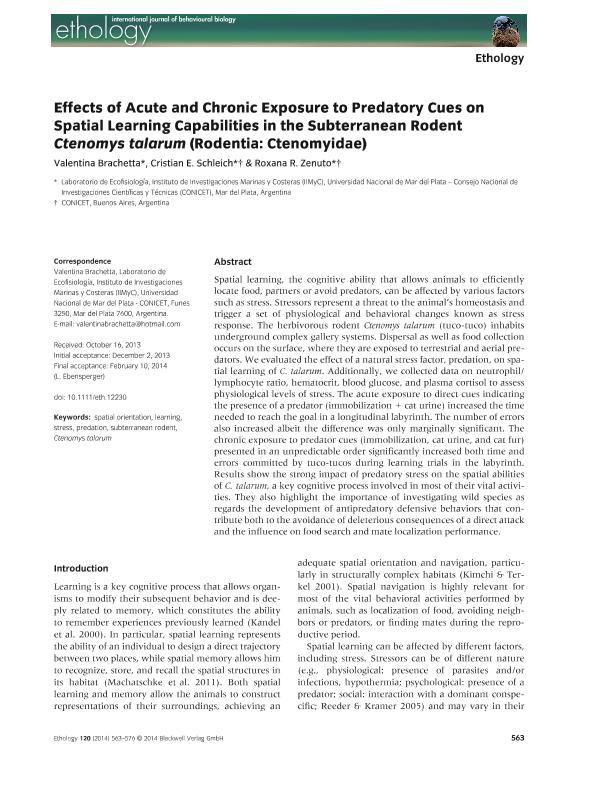Artículo
Effects of Acute and Chronic Exposure to Predatory Cues on Spatial Learning Capabilities in the Subterranean Rodent Ctenomys talarum (Rodentia: Ctenomyidae)
Fecha de publicación:
02/2014
Editorial:
Wiley Blackwell Publishing, Inc
Revista:
Ethology
ISSN:
0179-1613
Idioma:
Inglés
Tipo de recurso:
Artículo publicado
Clasificación temática:
Resumen
Spatial learning, the cognitive ability that allows animals to efficiently locate food, partners or avoid predators, can be affected by various factors such as stress. Stressors represent a threat to the animal's homeostasis and trigger a set of physiological and behavioral changes known as stress response. The herbivorous rodent Ctenomys talarum (tuco-tuco) inhabits underground complex gallery systems. Dispersal as well as food collection occurs on the surface, where they are exposed to terrestrial and aerial predators. We evaluated the effect of a natural stress factor, predation, on spatial learning of C. talarum. Additionally, we collected data on neutrophil/lymphocyte ratio, hematocrit, blood glucose, and plasma cortisol to assess physiological levels of stress. The acute exposure to direct cues indicating the presence of a predator (immobilization + cat urine) increased the time needed to reach the goal in a longitudinal labyrinth. The number of errors also increased albeit the difference was only marginally significant. The chronic exposure to predator cues (immobilization, cat urine, and cat fur) presented in an unpredictable order significantly increased both time and errors committed by tuco-tucos during learning trials in the labyrinth. Results show the strong impact of predatory stress on the spatial abilities of C. talarum, a key cognitive process involved in most of their vital activities. They also highlight the importance of investigating wild species as regards the development of antipredatory defensive behaviors that contribute both to the avoidance of deleterious consequences of a direct attack and the influence on food search and mate localization performance.
Archivos asociados
Licencia
Identificadores
Colecciones
Articulos(IIMYC)
Articulos de INSTITUTO DE INVESTIGACIONES MARINAS Y COSTERAS
Articulos de INSTITUTO DE INVESTIGACIONES MARINAS Y COSTERAS
Citación
Brachetta, Valentina; Schleich, Cristian; Zenuto, Roxana Rita; Effects of Acute and Chronic Exposure to Predatory Cues on Spatial Learning Capabilities in the Subterranean Rodent Ctenomys talarum (Rodentia: Ctenomyidae); Wiley Blackwell Publishing, Inc; Ethology; 120; 6; 2-2014; 563-576
Compartir
Altmétricas




